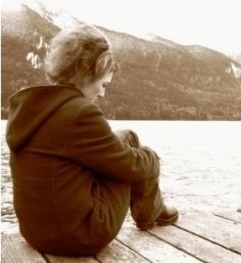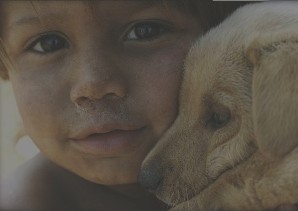|
It is not that people are cold or uncaring, but that they simply do not know the severity of your heartbreak... just because there is no physical death associated with your loss. Also, they do not even know that you have a close emotional attachment to "that special something" which you have lost.
Grief is not reserved for bereavement only; all types of loss can trigger our grief responses. No one can escape from the touch of
loss. But some losses received more social recognition and support than others. And it is the disenfranchised grief - the kind of
grief that does not receive forth coming social support - that I am emphasize here. |

|
cyclical and recurrent |
This is not only the loss of a dream child, and the burden of taking care of the child's special needs, but it is also an on-going loss that others often do not understand.
The parents are repeatedly reminded of what their child could have been when seeing others' child advance in life.
Their grief is cyclical and recurrent.
The pain of losing an intimate companionship is often unrecognized or minimized. The grievers often hear comments such as "You deserve someone better; it is time to move on." The comments might have some truth in it, but the pain of the loss was never fully acknowledged.
The loss of dream to have a child of your own. Couples who are struggling with infertility often experience a sense of isolation because others often minimize the kind of loss. This good intention to console you could feel discounting.
The loss of the child who was never born can be as devastating as losing a loved one. Parents often form emotional attachment to a child even during pregnancy. The loss is often unexpected and it can feel as something going out of control. Grieving of the loss needs to be done properly before future pregnancy takes place.
Although the inflicted family member is still alive, he/she is never the same, or will ever be mentally present any more. You are losing the close relationship with the inflicted person, and you might also need to take on the caretaking task for the person over a long stretch of time. The relationship loss is compounded by the financial and caretaking burden.

|
can blow us away like a storm |
When several losses happen over a short period of time, this could create a trauma for the person. The person may not have completed the grieving for the previous loss, and is now having to face the devastating reality of a new loss.
Unfortunately, the support system may not understand the severity of the trauma for the person and not rally the support accordingly.
A birth mother who gives her child up for adoption often experience on-going intense grief through various cycles of the child's life, such as birthday, seeing other child of similar age graduating or getting married.
Children who were adopted often experience the grief of losing a idealized dream of an natural parent-child relationship that is idealized. The question of self-worth can come to be a question when these children wonder why they are given up in the first place.
Although most women who choose to terminate their pregnancy experience a sense of relief, others, especially those who terminate because of a fetal anomaly, experience grief at the death of their child.
What are shared in these people is the loss of innocence, the loss of basic trust, a sense of shame, and the sense of emotional invisibility. The pain of this loss is greater than what is being understood.

|
cannot be minimized |
But this loss is often minimized as insignificant and is consoled by the suggestion of just getting another one for replacement.
The gravity of loss involved with this type of tragedy is often not publicly acknowledged perhaps because their social network believes that it is better to keep such dark subjects off the topics of conversation. This avoidance strategy of the social world only leaves the mourners feel isolated and unentitled to process their feelings.
Children can experience disenfranchised grief when adult think that these children do not understand loss and therefore must not be able to experience grief. Unacknowledged loss like this can impact the children emotional balance.
The Secondary Loss of Unrecognized Grief
Disenfranchised grief happens sometimes because others do not acknowledge our untraditional loss. And other times it happens because we do not permit ourselves to go through the full grieving process. Perhaps we are afraid of the strength of the grief, perhaps we are afraid of being judged if we openly grieve.
When we use suppression to deal with our grief, we lose parts of our authentic self:

|
may be anger, anxiety, depression... |
- we lose our spontaneity;
- we lose our emotional presence;
- our controlled emotions may emerge in a different forms as
- anxiety;
- depression;
- anger;
- addiction;
- or somatic problems.
- anxiety;
Disenfranchised grief may remain hidden for years and years, only to be reenacted by later losses. Suppressed as it may be, the wounds screaming for healing. Because if not, the wounds only fester into something bigger.
Grief Support is Your Birth Right
If you’re experiencing any of the above loss or something similar, I want you to know that you are entitled to your grief.
Grief support is your birth right. You don't need to go it alone to go through this grieving process.Please find someone who understands this and affirms your right to grieve exactly as you need to. You grieve because your love is real and your loss is valid. Grieving is the first step of emotional re-birth.

|
as a renewed person |
If necessary, find a professional to facilitate your resolution of the loss.
When you complete your grieving, you will come through as a renewed person, with
- more energy to love;
- more ability to treasure your relationship present and future;
- more ability to create meaning and purpose in your choices.
Dr. Mei-whei Chen, Licensed Clinical Psychologist
737 N Michigan Ave, Ste 2130, Chicago, Illinois 60611
847-915-0331
Website: www.inner-awakening-counseling.com
Email: Mei@inner-awakening-counseling.com
Copyright © 2014 by Dr. Mei-whei Chen

